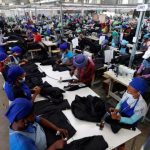The Centre for the Promotion of Private Enterprise (CPPE) has called on the Nigerian government to review the Expatriate Employment Levy (EEL) policy introduced recently, warning that it could hurt genuine investors in the country and also have devastating effects on Nigerians in the diaspora.
President Business Africa reports that President Bola Tinubu launched the EEL policy on February 28, 2024, with the goal of balancing economic growth and workforce development by ensuring equitable contributions from expatriate employment.
Join our WhatsApp ChannelThe president had during the launch, said the policy would close the wage gaps between expatriates and the Nigerian labour force while increasing employment opportunities for qualified Nigerians in foreign companies operating in the country.
According to a handbook released by the Ministry of Interior, the employment expatriate levy policy stipulated that companies operating in Nigeria that are employing foreign expatriates are expected to pay $15,000 for those at the level of director, and $10,000 for other categories of staff.
The handbook also stated that offences such as filing false information about foreign expatriates, and failing to register or submit data at the stipulated time would attract penalties such as a fine of N3 million or more.
The ministry, however, fixed April 15 for compliance with the policy.
Reacting to that, CPPE in a statement signed by the Chief Executive Officer, Dr Muda Yusuf, expressed concerns about the implications of the expatriate levy policy on investments in Nigeria’s economy, which President Bola Tinubu’s administration has been vigorously pursuing to boost.
Yusuf noted that the broad objectives of the policy are laudable in terms its “dual purpose of promoting the localization of skills and economic growth,” but warned that it may have “unintended consequences.”
He stated that there are extant legislations and regulations with similar objectives which include an expatriate quota that empowers the Nigeria Immigration Service to give approvals to companies for expatriate staff engagement only when there is no local capacity and payment of $2,000 per expatriate annually by companies hiring them. “This is an equivalent of about N3 million at current exchange rate.”
He also cited the National Content Act for the oil industry which according to him, “offers tremendous opportunities for indigenous investors to offer services to oil and gas companies,” part of the statement made available to Prime Business Africa stated.
“Indigenous capacity in the sector had grown remarkably since the enactment of the act.
“There are presidential Executive Orders 3 and 5 which directed the MDAs to give first right of refusal to indigenous contractors, service providers for procurement purposes.”
The think tank pointed out that the implementation of these legislations and regulations has been very weak thereby affecting outcomes. “The problem is not lack of policies, but the institutional structure to deliver results,” it stated.
READ ALSO: Peg Import Duty Dollar Rate At N1000/$ – CPPE Urges CBN
Implications of the policy
Highlighting the implications of the policy, CPPE stated that the timeline of four weeks for the affected companies to comply will be “too short.” It said companies needed to be given a minimum of six months to comply with such a major policy shift to avoid disrupting their plans and projections.
It said: “Some of the companies affected are major investors that have invested billions of dollars and have been in Nigeria for decades. This administration, being an investment-friendly regime, should give companies more time.
“The country needs more direct investors than portfolio investors at this time. But ironically, both foreign direct investors and domestic direct investors would be more negatively impacted than portfolio investors.
“The economy needs more investors in the real economy – oil and gas, manufacturing, infrastructure, mining, ICT, Healthcare – all of which require varying skills and competencies. The truth is that major FDIs will typically come with some critical staff to oversee their investments. It is imperative to give some consideration to this class of investors, given the scale of their investments which could be in billions of dollars.”
While noting that the challenge of influx of foreigners, especially the unskilled ones are more pronounced in some sectors CPPE urged the Nigerian government to target the policy at the more vulnerable ones like construction, distributive trade, hospitality and logistics.
It said the policy would have serious implications for Nigerians in the diaspora if other countries decide to reciprocate by coming up with such against the citizens working abroad.
“There are serious implications for diaspora Nigerians. The policy may trigger reciprocal actions from other countries and this may affect Nigerians in the diaspora.
“There are currently over 17 million Nigerians in various countries around the world doing extremely well in the fields of Education, Medicine, Health, Sports, Media & Entertainment, Leadership & Politics, Finance, Science & ICT, Transportation, Tourism, Industry and Agribusiness. This is a pool of very valuable external sector assets for us as a country.
“We have the largest diaspora population in Africa. We also have the highest diaspora remittances on the continent, generally in excess of $20 billion. All of these could be at risk as a result of this policy.
“If the reciprocity policy is activated in any of their host countries, the effect on our diaspora citizens will be very devastating.
He said the policy may be a setback for the continental economic integration envisioned by the creation of the African Continental Free Trade Area [AfCFTA].
“Nigeria occupies a leadership position in Africa and is very well respected. Our president is the current chairman of ECOWAS. This policy does not make an exception for our African brothers and neighbours. This is coming at a time when the African Continental Free Trade Area [AfCFTA] is gaining traction. This policy could be a major setback for the continental economic integration vision. Besides, many of our citizens are in many African countries. They may be victims of reciprocal actions by other African countries.
“The CPPE appeals to government to review the policy and undertake broader consultation to fine-tune the policy to ensure that we do not hurt genuine investors in the country.
“It is also important to worry about the implications of possible diplomatic reciprocity, especially for our diaspora community,” the centre further warned.
Victor Ezeja is a passionate journalist with seven years of experience writing on economy, politics and energy. He holds a Master's degree in Mass Communication.

















Follow Us